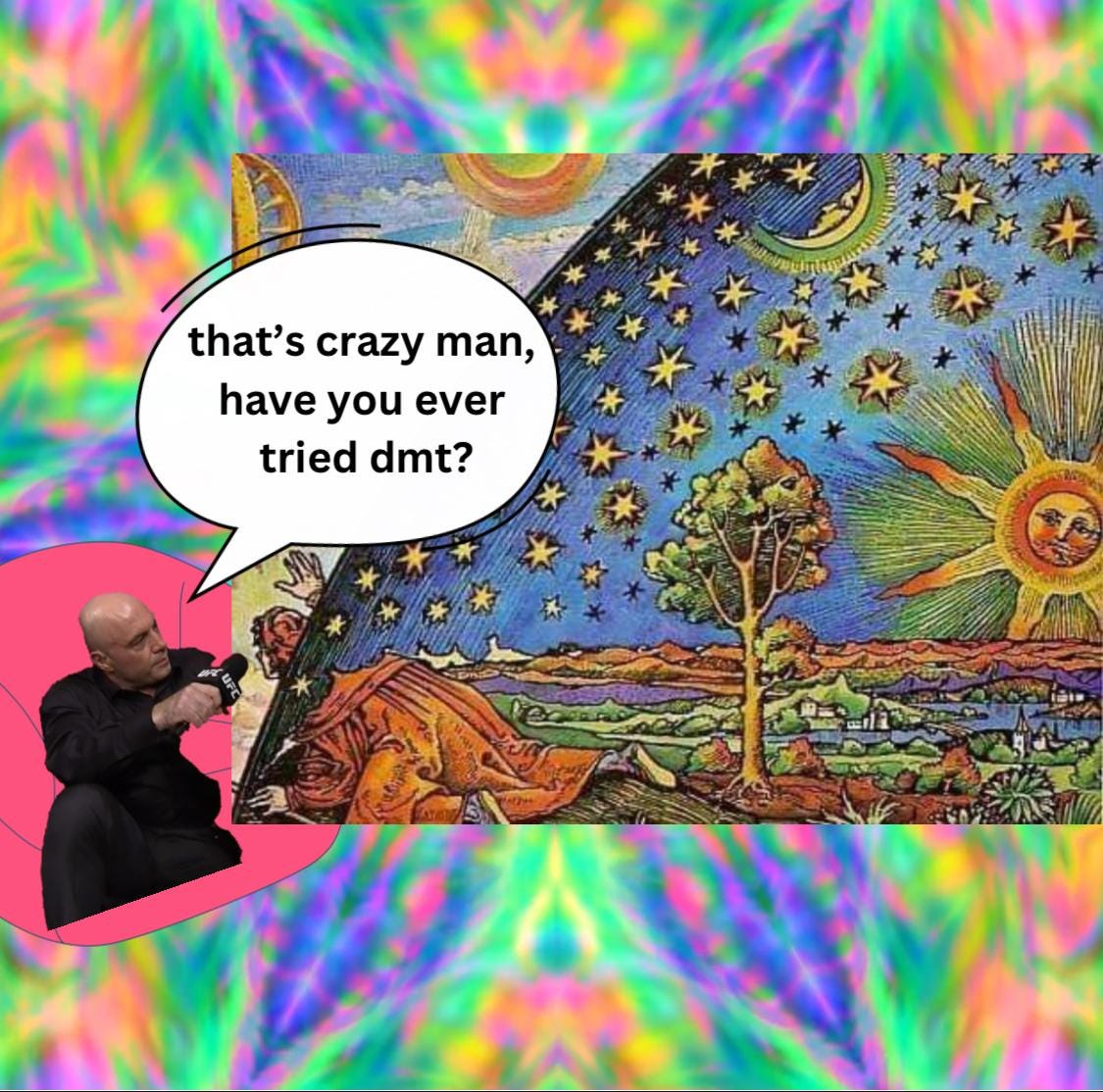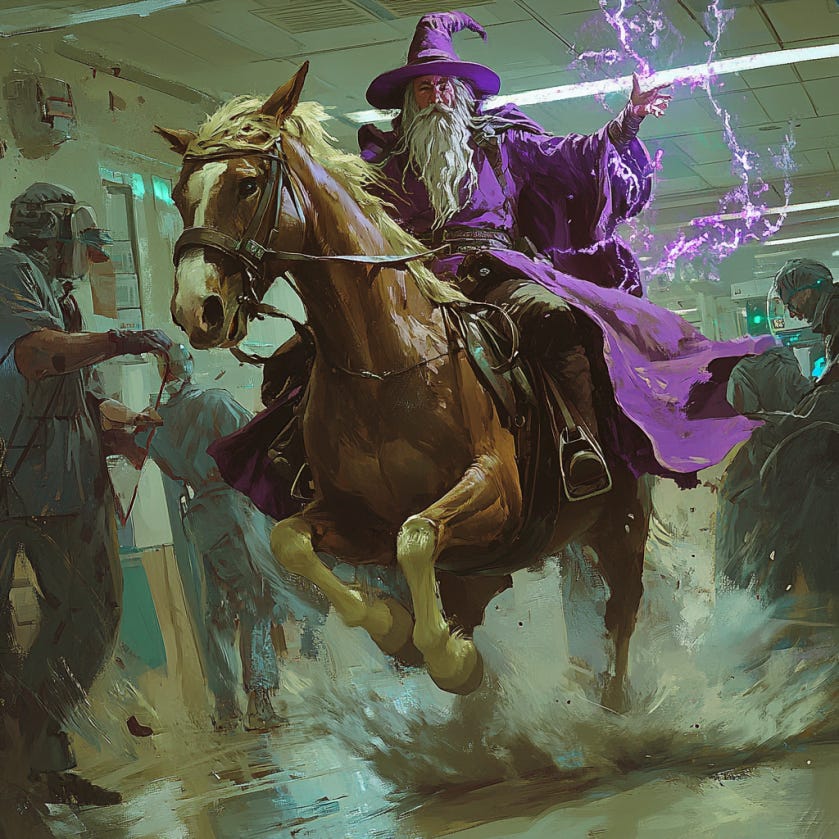There's a Horse Loose in a Hospital
When the going gets weird, the pros.... turn weird?
[This article has a 6/10 Woo Rating]
It’s like there’s a horse loose in a hospital.
I think eventually everything’s going to be okay, but I have no idea what’s going to happen next. And neither do any of you, and neither do your parents, because there’s a horse loose in the hospital. It’s never happened before, no one knows what the horse is going to do next, least of all the horse. He’s never been in a hospital before, he’s as confused as you are.
There are no experts.
-John Mulaney
Mulaney wrote his hilarious “horse in a hospital” bit about Trump’s first presidency. And because the Universe isn’t always subtle, a real horse recently broke loose in a New Orleans hospital parking lot. But this article isn’t about politics. Writing about politics is a great way to alienate half of your audience while saying nothing of enduring value. I don’t “follow politics” anymore either: the big news finds me, and following the small news only gives me brain damage.
Mulaney’s metaphor is pointing at something more interesting. The befuddled reaction to the Trump tariffs were just another example of trying to apply rational analysis to an unprecedented anomaly. I’ve watched this dissonance break the brains and spirits of many rocket-scientist I.Q.s, especially since COVID. In a rare moment of self awareness for a politician, U.K. Prime Minister Keir Starmer wrote this weekend that “first it was defence and national security. Now it is the global economy and trade. Old assumptions can no longer be taken for granted. The world as we knew it has gone.” It brings to mind a man bent over examining each strange new rainbow toadstool he encounters, without realizing he’s wandered into an enchanted forest. Because it’s not just unprecedented climate, geopolitical and economic events, we’re also encountering higher woo-rating anomalies by the day. When the global epidemic of UAP sightings, Telepathy Tapes or recent discoveries under the pyramids at Giza show up in our lives, who do we go to for proof or debunking?
Enter the Shamanoids
We used to have a whole class of people with the perfect mindset to assess weird stuff. It’s not “the experts,” it’s what Layman Pascal calls “the shamanoids.” When you were facing crisis or stasis, the shaman would put themself into an altered state and get a different perspective on the situation. Siberian shamans can supposedly shapeshift and inhabit the soul of a bear. This helps the community’s hunters to understand the bear’s mindset. The horse may have never been in a hospital before, but a true shaman can anticipate its movements.
The fundamental skillset of a shamanoid is the ability to see beyond a limiting frame. Cognitive science professor John Vervaeke explains this intuitive capacity in terms of the Nine Dot Problem.1 The goal of the puzzle below is to link all nine dots using four straight lines or fewer, without lifting the pen and without tracing the same line more than once. Try it yourself, the solution is at the bottom.2
Vervaeke uses this problem as an illustration because it involves literally thinking outside the box. In his recent book on Gurdjieff, Layman Pascal outlined the kinds of practices and mindsets required to cultivate your own shamanoid thinking.3 I also spent all of last year researching them for the Accelerating Wisdom Series. Intelligence works for an orderly world, but only wisdom works for a chaotic one.
In terms of external guidance, the answer isn’t the nihilistic refrain of “nobody knows anything,” it’s simply that we’re asking the wrong people. While the expert class paid to pretend they still understand the world flounders, we should be seeking out those living at the edge of the village.
Bring Out the Clowns
It’s an excellent idea to cultivate shamanoid thinking. It’s certainly more useful than spending your evenings waiting to see how much the market is down, on news you couldn’t possibly anticipate. But there is simply the unavoidable fact that many shamans are either born neurodivergent or called into their role by ancestral lineage. You probably only get so much choice as to whether to be a shaman. And that’s a good thing; initiation can involve a descent into madness and years of psychic dismemberment.4 It’s not a position automatically conferred by taking a boatload of psychedelics, then putting on robes and mala beads. The problem is, things have been orderly enough for long enough that we don’t listen to the real shamanoids anymore. Many of them are isolated in jail, asylums or, worse, Bali.
Who are the few remaining prominent shamanoids? Joe Rogan (and his eclectic guest selection) is probably the best contemporary example. While he can be justifiably accused of platforming people with dangerously poor discernment, he’s also mainstreamed marginalised topics of civilizational importance. Psychedelics, ancient civilizations, psychic abilities and UAPs could all end up being facets of an emerging paradigm shift.
What’s noteworthy about Rogan is that he is, among many things, a comedian. The John Mulaney quote I opened with shows the unique ability of a comedian to capture the deep truth of a moment. This is also what a prophet or shaman does; they see something that’s true, but hidden or taboo, and put words on it. Comedians do the same thing, but with marginally lower crucifixion risk. The reason the court jester wears silly little bells and makes fart jokes is so he doesn’t get beheaded for speaking truth to power. As George Bernard Shaw said “If you want to tell people the truth, make them laugh, otherwise they'll kill you.”
Modern comedy has tended to focus on “shadow” topics. Some of Louis C.K.’s best material is talking about the raw realities of parenting that we all feel, but rarely have the courage to say. That’s the observational genius of a comic great. The problem is that now our collective shadow is really pretty obvious material. It’s why Dave Chapelle’s recent specials targeting woke politics are so unfunny. The real opportunity now is for comedians with reach and talent to do something much braver and harder.
Today’s common knowledge game is revealing the reality of mysticism. It’s about the spiritual waters the shaman swims in and the psychotic drowns in. I believe we are on the cusp of a monumental common knowledge moment.5 For the last few years, I have been flooded with “serious people” fascinated by all topics related to consciousness. They all think they’re alone and they’ll get mocked or ostracised if they speak up. This is the expectations gap where a good punchline lives.
The problem is that some spiritual people take themselves FAR too seriously and there’s nothing intrinsically amusing about most of these topics. The point here isn’t to mock spirituality; that’s the easiest of targets. It’s to speak the truths from outside the rationalist-industrial complex: the box that’s kept us mentally imprisoned for decades.
Because it’s so difficult, there aren’t many funny mystics. As my friend Bodhi wrote earlier today, The Fourth Way stands out as a mystical meme savant on whatever is left of social media.

Another good example from the world of standup is Pete Holmes’ viral minute-long bit “God is No-Thing.”6
Some people think God created the universe.
Some people think nothing created the universe, which is the funniest guess and the nothing people make fun of the God people. They say, “God doesn't exist.”
I'm like, okay, maybe. But you know what definitely doesn't exist? Nothing. That's the defining characteristic of nothing is that it doesn't exist.
So what are we talking about? Either you think it's God, something you can't see, touch, taste, photograph, and science can't prove, or you think it's nothing, something you can't see, touch, taste, photograph, and science can't prove. But I think we can all agree if nothing, your nothing, sometimes spontaneously erupts into everything. That's a pretty goddamn magical f*%&ing nothing you guys!
Ask the nothing people, what happens when you die? They'll tell you nothing. You go into nothing.
I'm like, you mean you merge back with your creator? That's heaven, b$%*h.
Comedy that attacks the dying tyrant of scientific materialism may seem like a trivial act of rebellion. But it only took one little girl saying the emperor was naked to change everything for the whole town.
Please enjoy what I thought was a super fun interview with The Fourth Way
“I would like even now to stress the fact that the psychopathology of the Shamanic vocation is not profane, it does not belong to ordinary symptomatology, it’s not ordinary mental illness, it has an initiatory structure and signification, in short, it reproduces a traditional, mystical pattern. The total crisis of the future shaman, sometimes leading to complete disintegration of the personality into madness can be evaluated not only as an initiatory death but also as a symbolic return to the pre-cosmogonic chaos to the amorphous and indescribable state that perceives any cosmogony.”- Mircea Eliade
This is my favourite piece I’ve ever written, because it’s the only one I can read without cringing.
Thanks to Gytis Labasauskas for the tip!





I think you will enjoy these 2 recent talks by Erik Davis on this same subject. Last bit of the second maps out his 10 ways to navigate weirdness. Excellent.
https://www.youtube.com/live/GGxtbQ8fkho
https://www.youtube.com/live/l8nsQXbTKg0
And once again, quoting Tom...
https://johnstokdijkgmailcom.substack.com/p/about-entities